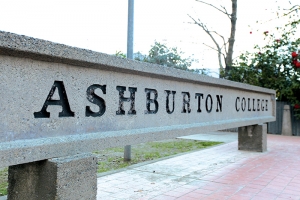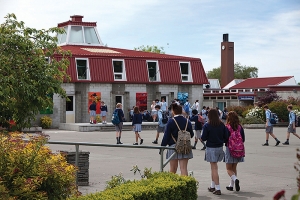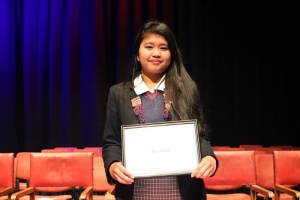Search

 The rebuild of Ashburton College’s elderly classrooms has been on the drawing board for several years and the project’s future is now in Government hands.
The rebuild of Ashburton College’s elderly classrooms has been on the drawing board for several years and the project’s future is now in Government hands.
College principal Ross Preece has been working with the Ministry of Education’s property advisors on the rebuild and said what happened next was up to Cabinet.
“We know we’ve cleared the ministry’s hurdles, we’ve done all we can and it’s up to Cabinet to decide how many dollars they’ll give us,” he said.
The ministry could recommend a scale of work and put a dollar value around this, but the power lay with Cabinet to say yes, or no, Preece said.
“The good news is that we will know the decision early in the new year and if there is a significant rebuild with large dollars around it the minister will announce it.”
Most parts of the college were shabby and run down and the college’s dilemma now was whether to spend money on upgrading those blocks if they were to come down in five years, he said.
Upgrade work will be carried out on the school’s mini-gym but work on the auditorium will be deferred until the outcome of the building proposal is known.
“We’re having to do selective work until we know but drab, grey concrete blocks might be fine in East Berlin but not in a modern learning environment.”
In terms of a time frame, Preece anticipates that if funds for a rebuild are approved, the ‘new’ college is unlikely to be completed before 2021.
The college was at 100 per cent capacity in terms of classroom space but it was fortunate in having plenty of green spaces and the old netball court area where prefab classrooms could be placed during a rebuild, he said.
By Sue Newman © The Ashburton Guardian - 8 November 2018
 An innovative curriculum change at Ashburton College has been given overwhelming support by both students and parents.
An innovative curriculum change at Ashburton College has been given overwhelming support by both students and parents.
The college has developed a pilot programme for next year’s Year 9 students that will use a new approach to learning based on developing students’ resilience, creative problem solving and communication skills.
About 60 per cent of next year’s Year 9 students will be involved in the pilot that will see students involved in a project based learning model that sees the integration of some subjects rather than working on the traditional standalone subject model, principal Ross Preece said.
“I’m really pleased with the response from both parents and staff; it looks as though we’ll have five or six of our 10 or 11 Year 9 classes in the pilot next year.”
The move into project-based learning would be a gentle one, however, with students spending between nine and 12 hours each week in pilot classrooms and the remainder in a traditional learning environment.
“Yes, there were parents concerned that they were making the right choice, but at the end of the day, but were not discarding tradition.
“You’ll still know how your child is achieving in standard subjects but we’ll also be reporting on what engages your child,” he said.
Project based learning was already being piloted in a number of other schools around New Zealand and the new model is similar to the learning environment students were accustomed to at intermediate and primary level, he said.
“But this is massive change, the first change in education in 100 plus years.”
Parents liked the new approach to learning because it prepared their child for what would be an uncertain future in a changing workplace, Preece said.
“We all acknowledge the future will be different and we can’t carry on doing the same as we have done in education for more than 100 years.
“It’s served us well but schools now have to be prepared to do things differently.
“And parents are understanding the future will be different so schools need to change and be different too.”
For teachers, the new learning environment would mean significant change, away from standing in front of a classroom to becoming a facilitator who moved between groups of students.
Schools could stick with tradition in a world where the workplace was changing, but that would not serve their students well, or they could change and make learning more relevant for tomorrow’s workplace, he said.
The Year 9 trial will provide a starting point for the future whole-school curriculum and the college was committed to continuing with subject integration for Year 10 students who wanted it in 2020.
By Sue Newman © The Ashburton Guardian - 8 November 2018
 Chrizia Cayanan was named dux of Ashburton College for 2018 on Wednesday night. Photo supplied.Eighteen-year-old Chrizia was named Ashburton College dux on Wednesday night at the Year 13 prizegiving and her brother Carl, 17, was named deputy head boy on Thursday at the Year 12 prizegiving.
Chrizia Cayanan was named dux of Ashburton College for 2018 on Wednesday night. Photo supplied.Eighteen-year-old Chrizia was named Ashburton College dux on Wednesday night at the Year 13 prizegiving and her brother Carl, 17, was named deputy head boy on Thursday at the Year 12 prizegiving.
The family came to Mid Canterbury from the Philippines in 2012 and Chrizia said mum Christina and dad Christopher, a motor mechanic at Honda Country, were very proud of what they’d achieved.
Chrizia was top student in physics, stats and accounting and scored highly in her other subjects to become dux ahead of the proxime accessit Artem Kravchenko. She was also awarded several scholarships.
Chrizia is heading to the University of Canterbury next year and has plans to be a secondary school maths teacher. She will be studying towards a Bachelor of Science, majoring in maths.
She said she had wanted to be a maths teacher since she was a young child and loved working with numbers. She also excelled in German and was one of two Ashcoll students to attend a scholarship language school in Germany last summer holidays.
Chrizia said she had worked hard over the years on her school work but also found time to be a member of the Ashburton Youth Council and hold down part-time jobs at a supermarket and berry farm.
The siblings have encouraged each other too, though they have different talents. “I am the brains and he is the people person,” she says with a laugh.
Teachers have also provided plenty of support and she names German teacher Ken Pow and accounting teacher Claire Bedward as her favourites.
She and Pow are competitive chess players.
Chrizia said her focus now was on exams, with calculus and accounting first up on November 13.
At the Year 12 prizegiving, the school’s 2019 leaders were named – head students are Mollie Gibson and William Wallis, with Harriet Stock and Carl Cayanan as deputies.
Principal Ross Preece said 10 girls and 13 boys put their hand up for consideration and the final four were chosen after an intense selection process.
“There were some quality candidates who didn’t make the short list and some quality candidates who were not chosen.”
He said the school had been well served by this year’s student executive, who were on hand as the head students’ names were revealed.
Naming deputies, which happened for the first time this year, had been successful and the four had shared the roles well, he said.
© The Ashburton Guardian - 3 November 2018


